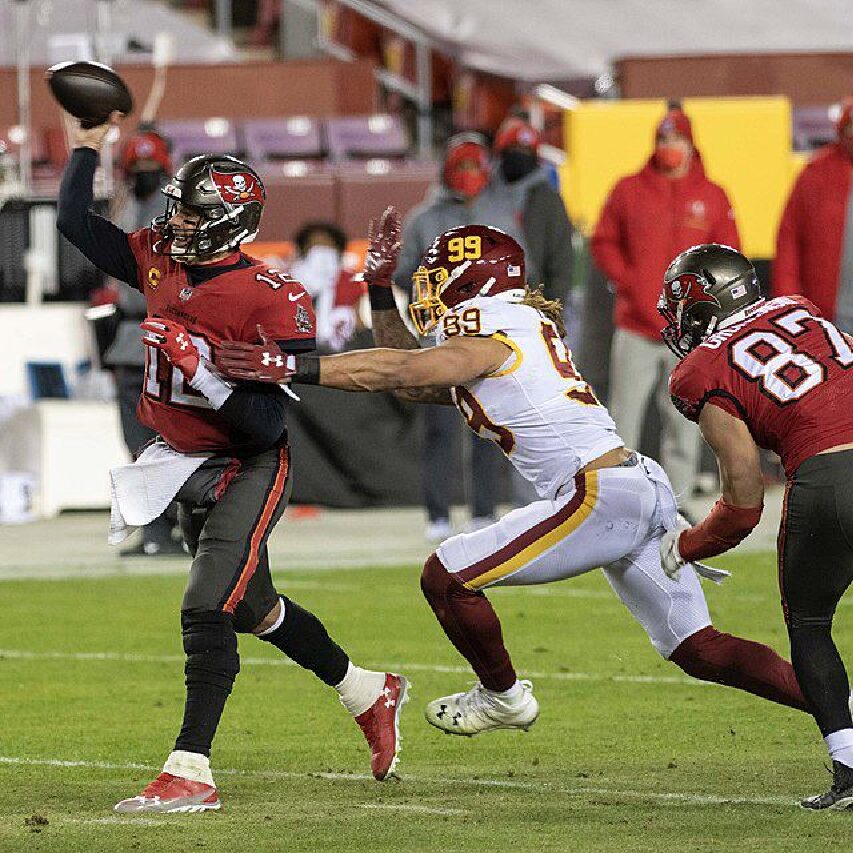At What Age Did Brady Stop Playing Football? Unpacking A Legendary Career
Many sports enthusiasts, perhaps you, wonder about the exact moment a truly iconic player steps away from the game. When considering someone like Tom Brady, whose career stretched across decades, the question of at what age did Brady stop playing football? becomes especially interesting. It's a query that speaks to his incredible endurance and a playing life that seemed to defy the usual limits of time on the field, you know.
His journey in professional football was, to be honest, unlike almost any other we have witnessed. For years, people watched him perform at a level that most athletes only dream of reaching, even when they are much younger. His presence in the league seemed, in a way, like a constant, a fixed point in a sport that changes so rapidly.
This article aims to provide a clear answer to that often-asked question about his final playing days. We will also look at some details about his amazing time in the sport and what made his career so long and memorable. You might be curious, so let's get into the specifics of his playing years and the age he was when he finally called it quits, as a matter of fact.
Table of Contents
- Tom Brady: A Brief Biography
- Personal Details and Bio Data
- Brady's Retirement Age: The Answer
- The First Retirement and the Comeback
- What Allowed Brady to Play So Long?
- The Impact of His Longevity
- Calculating Age with Precision
- The End of an Era
- Frequently Asked Questions (FAQs)
Tom Brady: A Brief Biography
Tom Brady's story in football is one that, frankly, many find quite inspiring. He started his professional football journey after being picked by the New England Patriots in the 2000 NFL Draft. This was a rather late pick, you see, coming in the sixth round as the 199th player chosen overall. Nobody, it seems, expected him to become the legend he did, but he really proved everyone wrong.
He quickly rose to prominence, becoming the starting quarterback for the Patriots in his second season. From that point on, he led the team to an incredible number of victories and championships. His time with the Patriots was marked by consistent winning seasons and many Super Bowl appearances, truly setting a new standard for quarterback play in the league, you know.
After two decades with the Patriots, a move that surprised many, he decided to join the Tampa Bay Buccaneers in 2020. Even at an age when most players would have long since retired, he continued to perform at an elite level. He led the Buccaneers to a Super Bowl victory in his very first season with the team, further cementing his place as perhaps the greatest player in the sport's history, at the end of the day.
His career is often talked about for its sheer length and the sustained excellence he showed throughout. He played in more Super Bowls and won more championships than any other player. This kind of success over such a long period of time is, honestly, quite rare in professional sports, especially in a game as physically demanding as football, you know.
Personal Details and Bio Data
| Full Name | Thomas Edward Patrick Brady Jr. |
| Born | August 3, 1977 |
| Birthplace | San Mateo, California, USA |
| Height | 6 ft 4 in (1.93 m) |
| Weight | 225 lb (102 kg) |
| Position | Quarterback |
| NFL Draft | 2000 / Round: 6 / Pick: 199 |
| College | Michigan |
| NFL Teams | New England Patriots (2000–2019), Tampa Bay Buccaneers (2020–2022) |
| Career Highlights | 7x Super Bowl Champion, 5x Super Bowl MVP, 3x NFL MVP, and many more. |
Brady's Retirement Age: The Answer
So, to answer the central question: at what age did Brady stop playing football? Tom Brady officially announced his second and, as of now, final retirement from the NFL on February 1, 2023. At the time of this announcement, he was 45 years old. His last game played was on January 16, 2023, during the NFC Wild Card Round against the Dallas Cowboys, where his Tampa Bay Buccaneers lost, you know.
He had just completed his 23rd season in the league, a truly remarkable stretch for any professional athlete, let alone a quarterback in such a high-impact sport. Playing into his mid-40s is, honestly, something that had rarely, if ever, been seen at the highest level of professional football. It really makes you think about what kind of dedication that takes, you know.
His birthdate is August 3, 1977. So, when he played his last game in January 2023, he was still 45 years old, having not yet reached his 46th birthday. This makes his longevity even more striking, considering the physical toll the game takes on players. It's almost unheard of, really, to be playing at that age.
Many people had speculated about when he would finally step away, given his age and the fact that he had already briefly retired once. His decision in early 2023 marked the definitive end of a playing career that spanned parts of three different decades, which is pretty wild to think about, as a matter of fact.
The First Retirement and the Comeback
It is worth noting that Tom Brady did, in fact, retire once before his final decision in 2023. On February 1, 2022, he announced his retirement after the Tampa Bay Buccaneers' season ended. At that time, he was 44 years old, having just finished his 22nd season in the NFL. This first announcement came as a surprise to many, especially since he was still playing at a very high level, you know.
However, that retirement was very short-lived. Just 40 days later, on March 13, 2022, he announced that he would be returning to play for the Buccaneers for the 2022 season. This decision, honestly, sent ripples through the sports world. It showed his continued passion for the game and his desire to compete for another championship, you know.
His return for the 2022 season meant he would play at age 45, which pushed the boundaries of what was thought possible for a quarterback. This brief un-retirement period added another layer to his already unique story. It made his eventual, final retirement in 2023 even more significant, as it truly felt like the end this time, you see.
The fact that he came back for another year, despite having already achieved so much, speaks volumes about his competitive spirit. It was, in some respects, a bonus season for fans and a chance for him to perhaps try for one more title. That season, though it didn't end in a Super Bowl win, further cemented his reputation for incredible perseverance, you know.
What Allowed Brady to Play So Long?
Many factors contributed to Tom Brady's ability to play football at an elite level for so many years, well past the age when most players hang up their cleats. One major aspect was his intense focus on physical conditioning and recovery. He followed a very strict diet and exercise regimen, often referred to as the "TB12 Method," which emphasized pliability and muscle recovery, you know.
His diet was famously restrictive, avoiding many common foods and focusing on organic, whole foods. This kind of discipline, frankly, is quite rare among athletes, especially over such a long period. He really put a lot of effort into keeping his body in top shape, which is obviously important for anyone, but especially for a professional athlete, you see.
Beyond the physical, his mental toughness and dedication to the game played a huge part. He consistently demonstrated an unparalleled work ethic and a deep understanding of the game. His ability to read defenses and make quick decisions helped him avoid many of the big hits that can shorten a quarterback's career, which is pretty smart, honestly.
The rules of the game also changed over time to better protect quarterbacks, which likely helped extend his career by reducing the number of brutal hits he took. Furthermore, he played for teams that were consistently well-coached and had strong supporting casts, which, in a way, helped him succeed and stay healthy. It's a combination of many things, really, that allowed him to play for so long, you know.
His position as a quarterback also generally allows for a longer career compared to more physically demanding positions like running back or linebacker. Quarterbacks, while still subject to hits, are less involved in direct, constant physical collisions on every play. This positional advantage, combined with his personal efforts, really made a difference, you see.
The Impact of His Longevity
Tom Brady's extended career had a huge impact on the sport of football and on sports discussions generally. He redefined what was thought possible for an athlete's career length, especially in a high-contact sport like the NFL. His continued success into his 40s made people rethink the limits of human performance and aging in sports, you know.
His longevity also meant that he broke countless records, many of which might stand for a very long time. Things like most career passing yards, most career touchdown passes, and most Super Bowl wins are statistics that really highlight his unique place in the game's history. It's pretty amazing, honestly, how many records he holds, you know.
For fans, watching him play for so many years created a unique connection. Generations of football followers grew up watching him, from his early days with the Patriots to his final seasons with the Buccaneers. His presence provided a sense of continuity and excellence that was, frankly, quite comforting to many, you see.
His career also sparked conversations about athlete wellness, recovery, and the science of sports performance. The methods he used to stay in shape became topics of interest for other athletes and even everyday people looking to improve their own health. He certainly left a lasting mark on how athletes approach their physical well-being, as a matter of fact.
The discussion around his age and performance also highlighted the mental side of sports. His continued drive and motivation, even after winning so much, showed a deep love for the competition itself. That kind of sustained mental focus is, arguably, just as important as physical ability for such a long career, you know.
Calculating Age with Precision
When we talk about someone's age, especially for a specific event like retirement, getting the exact number can be quite interesting. For instance, to figure out precisely at what age did Brady stop playing football?, we use tools that consider every detail. Our site, for example, offers a free age calculator that computes age in terms of years, months, weeks, days, hours, minutes, and seconds, given a date of birth, you know.
This means you can go beyond just knowing he was 45. You could, in fact, find out exactly how many days, hours, or even minutes he had lived up to his retirement announcement on February 1, 2023. This kind of precise calculation accounts for leap years, varying month lengths, and other calendar complexities to ensure accuracy, which is pretty neat, honestly.
So, if you are asking yourself how old am I and need an answer accurate to the second, or if you want to know the exact duration between two important dates, a tool like this is very useful. It allows for a much deeper look at chronological age, birthday calculations, and even fascinating statistics about your life, including total days lived, hours lived, and so on. You can calculate your age from birthdate, or find the length of time between any two dates, which is pretty handy, you know.
Using such an age calculator is really simple. You just input a birthdate and a target date, and it gives you the precise age. This can be fun for personal use, or for understanding the exact length of time a significant event, like a long sports career, truly spanned. It's a way to appreciate the passage of time with much more detail, you see.
The End of an Era
Tom Brady's final retirement truly marked the end of an extraordinary era in professional football. For over two decades, he was a dominant force, consistently performing at a level that few could match. His decision to step away at 45 years old, after 23 seasons, closed a chapter that many thought would never truly end, you know.
His career will forever be a benchmark for longevity, success, and dedication in sports. The question of his retirement age is just one small piece of a much larger story about a player who pushed the boundaries of what was believed possible. It's a story that will, frankly, be told and retold for many years to come, you see.
As we look back, it's clear that his time in the NFL was nothing short of legendary. He left the game having achieved more than any other player, and his impact extends far beyond just the statistics. He really changed the way people think about athletic careers, which is a pretty big deal, honestly, at the end of the day.
His journey reminds us that with enough determination and the right approach, people can achieve incredible things, even as time passes. It's a powerful message, really, about pushing personal limits. You can learn more about his career statistics and achievements on a sports history website, for instance, to get a full picture of his impact.
Frequently Asked Questions (FAQs)
When did Tom Brady officially retire for the final time?
Tom Brady officially announced his final retirement from professional football on February 1, 2023. This announcement came after the completion of the 2022 NFL season, which was his 23rd season in the league, you know.
How many Super Bowls did Tom Brady win during his career?
Tom Brady won a total of seven Super Bowl championships during his career. Six of these wins came with the New England Patriots, and one was with the Tampa Bay Buccaneers, which is quite a record, honestly.
What was Tom Brady's last team?
Tom Brady's last professional football team was the Tampa Bay Buccaneers. He played for them for three seasons, from 2020 to 2022, after spending his first 20 seasons with the New England Patriots, you see.

How Old Does Tom Brady Want To Be When He Stops Playing Football?

How is Tom Brady still playing at 45 years old? – Slick Magazine

Is This Really The Age Tom Brady Thinks He Will Quit Playing Football?